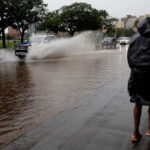In the complex tapestry of South African politics, few threads are as tangled and potentially explosive as the accusations leveled by Lieutenant-General Nhlanhla Mkhwanazi, the KwaZulu-Natal Police Commissioner. His story, a narrative of alleged corruption reaching the highest levels of government, has captured the nation's attention and sparked a fierce debate about the integrity of its institutions. But to truly understand the gravity of Mkhwanazi's claims, we must delve into the historical context and the key players involved.
The story begins with a man who is seen by many as a fearless crusader against corruption. Mkhwanazi, a veteran officer with a reputation for being a "no-nonsense" figure, first gained prominence almost fifteen years ago. Back then, serving as South Africa's acting police chief, he made the bold decision to suspend Richard Mdluli, a close ally of then-President Jacob Zuma. Mdluli, who was the head of crime intelligence, was later found guilty of serious offences, including kidnapping, assault, and intimidation. Mkhwanazi's actions were seen as a clear message that no one, regardless of their political connections, was above the law.
Luckily, Mkhwanazi's story didn't end with the demotion former President Jacob Zuma slapped him with. In 2018, he made a surprising comeback when Bheki Cele, the then-Police Minister, appointed him as the provincial police chief in KwaZulu-Natal. This province, known for its intense political rivalries and lucrative state tenders, was also plagued by a high number of political killings. Mkhwanazi's task was clear: to bring stability and accountability to a region marred by strife.
The situation escalated when Mkhwanazi publicly accused Police Minister Senzo Mchunu of having links to criminal gangs. He claimed that Mchunu had shut down an elite unit that was investigating political murders after it uncovered a drug cartel with connections to the business sector, prison system, prosecution service, and judiciary.
On 6 July 2025, Mkhwanazi, dressed in a military-style uniform and surrounded by armed officers, held a press conference to make his allegations public. He stated that a drug cartel based in Gauteng was controlling a high-level criminal network that had infiltrated various state institutions. He also accused Mchunu and Lieutenant-General Shadrack Sibiya, the Deputy National Commissioner of Crime Detection, of obstructing investigations into political killings and organised crime. Mchunu and Sibiya have denied these accusations.
The reaction to Mkhwanazi's allegations was immediate and divided. Mchunu dismissed the claims as baseless, but a significant portion of the public rallied behind Mkhwanazi. Social media platforms were flooded with messages of support, with #HandsoffNhlanhlaMkhwanazi trending as a warning to the government.
The political fallout from Mkhwanazi's accusations has been significant. President Cyril Ramaphosa has launched a commission of inquiry into the matter, and Mchunu has been placed on special leave. Gwede Mantashe is currently serving as acting police minister, with Firoz Cachalia scheduled to take over in August. Masemola announced that Sibiya has also been placed on leave.
Parliament held a joint committee meeting to discuss Mkhwanazi's allegations and how to oversee the police service effectively. The meeting revealed deep divisions among politicians, with some expressing support for Mkhwanazi and others questioning his motives.
Eugene Mthethwa of the EFF voiced strong support for Mkhwanazi, stating that "We are General Mkhwanazi and General Mkhwanazi is us." He also warned that if anything were to happen to Mkhwanazi, the country would "see fire." Mthethwa highlighted the public's support for Mkhwanazi and suggested that his press conference was a desperate attempt to be heard after other channels had failed.
However, not everyone shares this view. Fadiel Adams, leader of the National Coloured Congress, expressed suspicion about Mkhwanazi's allegations. He questioned why Mchunu and Sibiya were suspended based solely on allegations, while other officers who had been arrested remained at work. Adams suggested that Mkhwanazi's press conference was a "staged" event designed to deflect attention from the possible arrest of National Police Commissioner Fannie Masemola.
Adams also pointed out that Mkhwanazi had worn Special Task Force camouflage during the press conference and was surrounded by armed officers, creating the impression of an "armed militia." He viewed this as a threat to the country and suspected that Mkhwanazi's actions were a pre-emptive move to prevent Masemola's arrest.
Adding another layer of complexity, Mkhwanazi's press conference appeared to reference Adams himself.
Mkhwanazi alleged that members of Crime Intelligence had released classified documents to a member of Parliament, who then registered a criminal case in Gauteng. Adams had indeed filed a case in Gauteng, and Mkhwanazi implied that Mchunu had been asked to interfere with the investigation.
The issue of whistleblowers and their safety has also been raised in connection with Mkhwanazi's allegations. Mzwanele Manyi of the MK party cautioned that "people are going to die in this process" and referenced the murder of Babita Deokaran, a whistleblower who was killed after flagging suspicious contracts.
His own best friend, Jerry Boshoga, a farmer and tenderpreneur like him, was kidnapped in broad day light in November last year at a KFC outlet in Centurion in movie-style. This was shortly after Jerry had been awarded multi-million Rand government tender. He has never been seen again since then.
So, exposing Cat Matlala is highly risky and once one does that, maximum security is a must-have. That is why the parliament was strongly warned by MK Party legislator Mzwanele Manyi that some people are going to die after Cat Matlala, Minister Senzo Mchunu and General Shadrack Sibiya were exposed by general Mkhwanazi.
Security has since been increased around the upscale residence of the KwaZulu-Natal Police Commissioner, Lieutenant-General Nhlanhla Mkhwanazi.
Mkhwanazi stated, during his media briefing, that he is a dedicated police officer and is willing to sacrifice his life for upholding the integrity of the police force by speaking the truth. He conveyed that he willingly chose to be a police officer, and throughout his extensive career, he has been involved in active combat situations.
According to observations made by the news crew last week, heavily armed members of the national intervention unit were stationed as guards outside the property. Several vehicles, including an SUV and a VW Golf 7, were present outside the premises.
A local business owner, who operates a bed and breakfast in the same vicinity, expressed concern regarding the heightened police presence at the property.
The resident reported that he initiated a conversation with the officers due to vehicles being parked on the pavement. He noted that they were hesitant to provide explanations regarding their sudden deployment. Instead, they responded jokingly, inquiring whether he was not pleased with the enhanced security measures in place.
The resident, who has resided at the property for over 40 years, mentioned that Mkhwanazi's predecessors had also occupied the same residence.
Mkhwanazi also communicated his readiness to die in the fight against criminals, some of whom he alleged to be high-ranking police officials and politicians involved in drug cartels in Gauteng.
Mchunu announced the dissolution of the political task team in January, stating that it was no longer necessary.
Mkhwanazi stated that since its establishment in 2018, the task team had investigated 612 dockets, apprehended 436 suspects, and recovered 156 firearms, with 55 of them being ballistically linked to politically related cases.
He reported that 35 police officials were arrested and charged for attempting to obstruct justice in these cases. A total of 128 accused individuals were found guilty in 106 cases, with 29 receiving life sentences. The remaining individuals received various other jail terms.
The implications of Mkhwanazi's accusations are far-reaching. If his allegations are proven true, they would expose a deep rot within the South African government and its institutions. The public's trust in the police force, which is already at an all-time low, would be further eroded. The country's efforts to combat organised crime and corruption would be severely undermined.
But if Mkhwanazi's allegations are false, he could face serious consequences. His credibility would be destroyed, and he could be held accountable for making false accusations against senior government officials.
The situation is further complicated by the history of political interference and corruption within the South African police force. Since 2000, there have been about ten different police chiefs, with one convicted of corruption and another facing criminal charges. This instability at the top has contributed to the force's inability to effectively tackle crime.

Follow Us on Twitter











